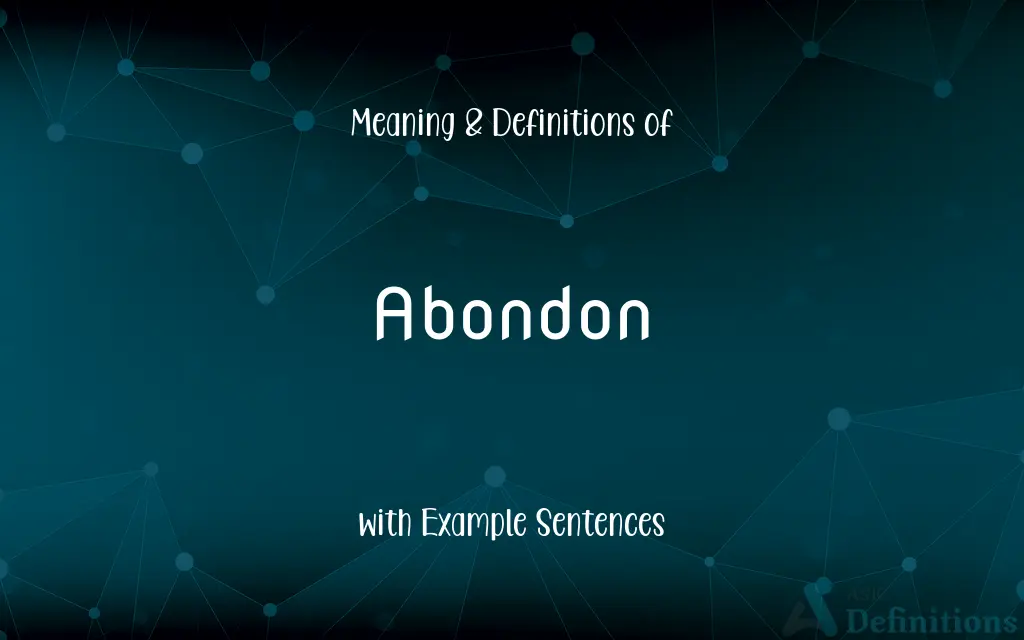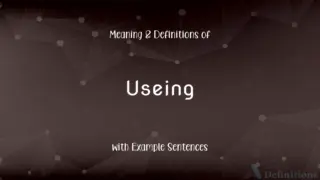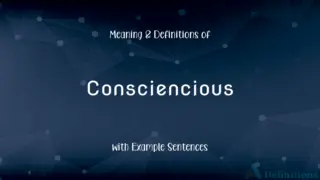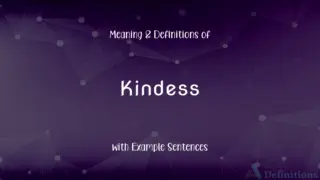Abondon Meaning and Definition
"Abondon" is not a standard word in the English language. Please consider the correct spelling, "Abandon." Misspellings can create confusion or diminish the perceived quality of the text.

Table of Contents
Abandon Definitions
"Abandon" means to leave something or someone permanently, especially when it is considered a duty or responsibility to stay.
The old house was abandoned many years ago.
"Abandon" refers to deserting or leaving something or someone without intent to return.
The ship was abandoned at sea during the storm.
"Abandon" conveys the idea of discarding something no longer wanted.
Old toys were abandoned in favor of new ones.
"Abandon" describes the act of stopping an activity or effort before completion.
The team was forced to abandon the game due to rain.
"Abandon" denotes giving up completely a practice, course of action, or way of thinking.
He decided to abandon his plans after the setback.
"Abandon" means to forsake or leave behind with no care or concern.
The cat was sadly abandoned by its owners.
"Abandon" implies relinquishing control or influence over something or someone.
She had to abandon control of the project due to health reasons.
"Abandon" signifies leaving a place, thing, or person, typically for negative reasons.
The building was abandoned after the fire.
"Abandon" represents the decision to stop doing something before it is finished.
Due to the storm, they had to abandon their hike.
"Abandon" means to renounce or disown any claim to or association with.
He abandoned his claim to the throne.
"Abandon" indicates leaving something in a state of neglect or disuse.
The car was found abandoned in the parking lot.
To withdraw one's support or help from, especially in spite of duty, allegiance, or responsibility; desert
Abandon a friend in trouble.
To give up by leaving or ceasing to operate or inhabit, especially as a result of danger or other impending threat
Abandoned the ship.
To surrender one's claim to, right to, or interest in; give up entirely
Abandon a belief.
To cease trying to continue; desist from
Abandoned the search for the missing hiker.
To yield (oneself) completely, as to emotion.
Great enthusiasm or lack of restraint
Skied with abandon.
(transitive) To give up or relinquish control of, to surrender or to give oneself over, or to yield to one's emotions.
(transitive) To desist in doing, practicing, following, holding, or adhering to; to turn away from; to permit to lapse; to renounce; to discontinue.
(transitive) To leave behind; to desert, as in a ship, a position, or a person, typically in response to overwhelming odds or impending dangers; to forsake, in spite of a duty or responsibility.
Many baby girls have been abandoned on the streets of Beijing.
She abandoned her husband for a new man.
To subdue; to take control of.
To cast out; to banish; to expel; to reject.
(transitive) To no longer exercise a right, title, or interest, especially with no interest of reclaiming it again; to yield; to relinquish.
I hereby abandon my position as manager.
(transitive) To surrender to the insurer (an insured item), so as to claim a total loss.
A yielding to natural impulses or inhibitions; freedom from artificial constraint, with loss of appreciation of consequences.
(obsolete) abandonment; relinquishment.
To cast or drive out; to banish; to expel; to reject.
That he might . . . abandon them from him.
Being all this time abandoned from your bed.
To give up absolutely; to forsake entirely ; to renounce utterly; to relinquish all connection with or concern on; to desert, as a person to whom one owes allegiance or fidelity; to quit; to surrender.
Hope was overthrown, yet could not be abandoned.
Reflexively: To give (one's self) up without attempt at self-control; to yield (one's self) unrestrainedly; - often in a bad sense.
He abandoned himself . . . to his favorite vice.
To relinquish all claim to; - used when an insured person gives up to underwriters all claim to the property covered by a policy, which may remain after loss or damage by a peril insured against.
Abandonment; relinquishment.
A complete giving up to natural impulses; freedom from artificial constraint; careless freedom or ease.
The trait of lacking restraint or control; freedom from inhibition or worry;
She danced with abandon
A feeling of extreme emotional intensity;
The wildness of his anger
Forsake, leave behind;
We abandoned the old car in the empty parking lot
Stop maintaining or insisting on; of ideas, claims, etc.;
He abandoned the thought of asking for her hand in marriage
Both sides have to give up some calims in these negociations
Give up with the intent of never claiming again;
Abandon your life to God
She gave up her children to her ex-husband when she moved to Tahiti
We gave the drowning victim up for dead
Leave behind empty; move out of;
You must vacate your office by tonight
Leave someone who needs or counts on you; leave in the lurch;
The mother deserted her children
Abandon Idioms & Phrases
Cast Abandon
To behave in an unrestrained or uninhibited manner.
They cast abandon to the winds and decided to go on an impromptu road trip.
Abandon Oneself to Something
To give oneself up entirely to a feeling or activity.
She abandoned herself to her music, forgetting about everything else.
Abandon Reason
To stop thinking logically or rationally.
In the heat of the argument, both parties seemed to abandon reason.
Leave in Abandon
To leave something behind without any intention to return or reclaim.
The house was left in abandon, with all its contents still inside.
Abandon to Fate
To stop trying to control or influence a situation and leave it to destiny.
After doing all they could, they abandoned the outcome to fate.
Abandon All Hope
To lose all hope or give up completely.
When they saw the storm approaching, the sailors felt like they had to abandon all hope.
Abandon Inhibition
To act without restraint or concern for social norms.
At the party, he danced with abandon, forgetting all his usual shyness.
With Gay Abandon
Acting freely and without restraint, often without concern for consequences.
The children played with gay abandon in the park.
Abandon Ship
To leave a failing or problematic situation, often quickly or abruptly.
When the company's stocks plummeted, many investors decided to abandon ship.
Abandon the Cause
To stop supporting or working for a particular idea or goal.
After years of little progress, he decided to abandon the cause.
Abandon Judgment
To stop forming opinions or making judgments, especially prematurely.
To truly understand the novel, readers must abandon judgment and immerse themselves in its world.
Abandon Control
To relinquish control or management of something.
The CEO had to abandon control of the company due to health reasons.
Abandon the Rules
To disregard or ignore the rules or guidelines.
In his quest for innovation, he often chose to abandon the rules.
Abandon Fear
To act without being hindered or limited by fear.
To achieve her dreams, she knew she had to abandon fear and take risks.
Abandon the Field
To withdraw from a competition, field of study, or activity.
After several defeats, the team decided to abandon the field.
Abandon Comfort
To leave a place of comfort and security for something uncertain or challenging.
She abandoned comfort to pursue her dream of traveling the world.
Abandon Tradition
To break away from traditional beliefs, practices, or customs.
The new artist chose to abandon tradition in favor of a more modern style.
Abandon a Plan
To give up on a planned course of action, usually due to its impracticality or the emergence of obstacles.
Due to unforeseen circumstances, they had to abandon their plan.
Abandon the Past
To stop being influenced or held back by past events or experiences.
He decided it was time to abandon the past and move forward.
Abandon Responsibility
To neglect or ignore one's duties or responsibilities.
He was criticized for his decision to abandon responsibility at such a critical time.
Abandon Example Sentences
The family was forced to abandon their home due to flooding.
They had to abandon their picnic plans because of the rain.
She decided to abandon her studies to pursue her dream.
The ship was abandoned in the middle of the ocean.
The old mine was abandoned when it ran out of ore.
The garden became overgrown after it was abandoned.
The old factory was abandoned many years ago.
The dog was left to wander after being abandoned.
The project was abandoned halfway through due to lack of funds.
They abandoned their attempt to climb the mountain when the weather worsened.
He abandoned his bicycle at the park.
After the accident, the car was abandoned by the roadside.
The explorers had to abandon their quest for the lost city.
The town had an eerie feel with all its abandoned buildings.
She abandoned her fear and dove into the pool.
Common Curiosities
Why is it called abandon?
It is called abandon because it refers to the act of leaving something or someone behind, often without the intention to return. The term originates from the Old French "abandoner," meaning to surrender or relinquish.
How many syllables are in abandon?
There are three syllables in abandon.
How do we divide abandon into syllables?
A-ban-don.
What is a stressed syllable in abandon?
The stressed syllable in abandon is the second one: a-BAN-don.
What is the first form of abandon?
The first form (base form) of abandon is "abandon."
How is abandon used in a sentence?
"The house has been abandoned for years, with no one taking care of it."
What is the root word of abandon?
The root word of abandon is the Old French "abandoner," which means to surrender or give up.
What is another term for abandon?
Another term for abandon could be "forsake" or "desert."
What is the singular form of abandon?
As a verb, abandon does not have a singular or plural form in the way nouns do.
What is the verb form of abandon?
Abandon itself is the verb form.
What is the pronunciation of abandon?
Abandon is pronounced as /əˈbændən/.
What is the opposite of abandon?
The opposite of abandon could be "retain," "keep," or "maintain."
Is abandon a noun or adjective?
Abandon is primarily a verb, but it can also function as a noun, as in "with reckless abandon."
Is the word abandon Gerund?
The gerund form of abandon is "abandoning."
Is the word “abandon” a Direct object or an Indirect object?
In a sentence, "abandon" as a verb can take a direct object, as in "They decided to abandon the project."
What is the plural form of abandon?
As a verb, abandon does not change form for plural subjects.
Is abandon an adverb?
No, abandon is not an adverb.
Is abandon a collective noun?
No, abandon is not a collective noun.
What is the second form of abandon?
The second form (simple past) of abandon is "abandoned."
What part of speech is abandon?
Abandon is a verb.
Which preposition is used with abandon?
Common prepositions used with abandon include "in" (as in "in abandon") and "with" (as in "abandon the house with regret").
Which conjunction is used with abandon?
Conjunctions like "and," "but," "or" can be used with abandon, depending on the sentence structure.
Which article is used with abandon?
When abandon is used as a noun, "the" can be used for specific instances (e.g., "the abandon of the old principles"), and "an" can be used in a more general sense due to the vowel sound at the beginning of the word.
What is the third form of abandon?
The third form (past participle) of abandon is also "abandoned."
Is abandon an abstract noun?
When used as a noun, abandon can be considered abstract as it refers to a concept or state of being.
Is abandon a vowel or consonant?
The term abandon contains both vowels (a, o) and consonants (b, n, d); it is not classified solely as a vowel or a consonant.
Is the abandon term a metaphor?
Abandon can be used metaphorically to describe giving oneself over completely to an emotion or activity.
Which determiner is used with abandon?
Determiners like "the," "this," "that," "my," "your" can be used with abandon when it functions as a noun, depending on the context.
Is abandon a negative or positive word?
Abandon generally carries a negative connotation, implying neglect or dereliction.
Is abandon a countable noun?
When used as a noun, abandon is generally uncountable, referring to a state or condition.
Is the word abandon imperative?
Yes, abandon can be used in the imperative form as a command, such as "Abandon ship!"
Which vowel is used before abandon?
Typically, no article is used directly before the verb form of abandon. When abandon is used as a noun, "an" can precede it due to the vowel sound at the beginning of the word, as in "an abandon of caution."
Share Your Discovery

Previous Term
Accelaration Meaning and Definition
Next Term
Aparent Meaning and Definition




























